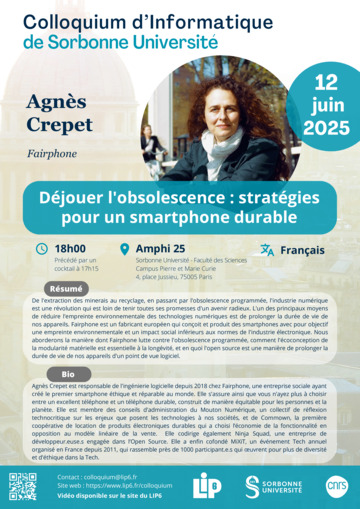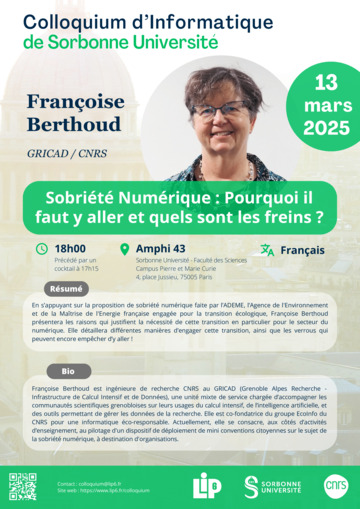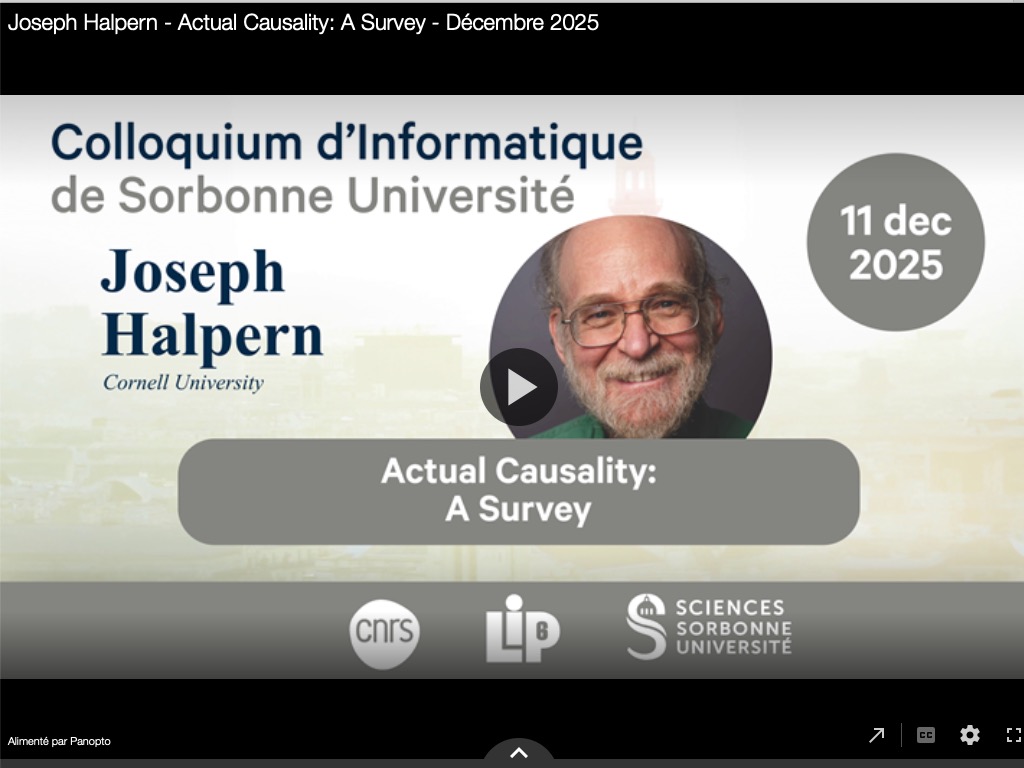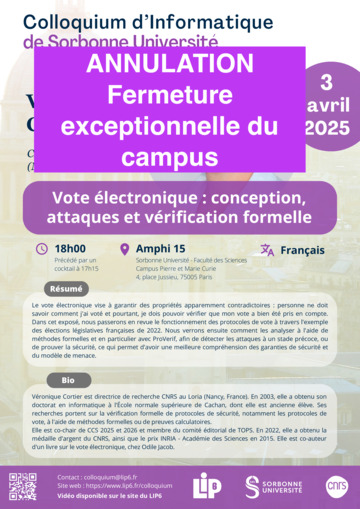Colloquium d’Informatique de Sorbonne Université
Joseph Halpern, Cornell University
Actual Causality: A Survey
Joseph Halpern received a B.Sc. (U. Toronto) in 1975 and a Ph.D. (Harvard) in 1981, both in mathematics. In between, he spent two years as the head of the Mathematics Department at Bawku Secondary School, in Ghana. After a year as a visiting scientist at MIT, he joined the IBM Almaden Research Center in 1982, where he remained until 1996, also serving as a consulting professor at Stanford. In 1996, he joined the Computer Science Department at Cornell University, where he is currently the Joseph C. Ford Professor and was department chair 2010-14. Halpern's major research interests are in reasoning about knowledge and uncertainty, security, distributed computation, causality, decision theory, and game theory. He is a fellow of AAAI, AAAS (American Association for the Advancement of Science), the American Academy of Arts and Sciences, ACM, IEEE, the Game Theory Society, the National Academy of Engineering, and SAET (Society for the Advancement of Economic Theory). Among other awards, he received the Kampe de Feriet Award in 2016, the ACM SIGART Autonomous Agents Research Award in 2011, the Dijkstra Prize in 2009, the ACM/AAAI Newell Award in 2008, and the Godel Prize in 1997, was a Guggenheim Fellow in 2001-02, and a Fulbright Fellow in 2001-02 and 2009-10. He was editor-in-chief of the Journal of the ACM (1997-2003) and has been program chair of the Symposium on Theory in Computing (STOC), Logic in Computer Science (LICS), Uncertainty in AI (UAI), Principles of Distributed Computing (PODC), and Theoretical Aspects of Rationality and Knowledge (TARK). He started the computer science section of arxiv.org, and serves on its advisory board.
What does it mean that an event C``actually cause'' event E? The problem of defining actual causation goes beyond mere philosophical speculation. For example, in many legal arguments, it is precisely what needs to be established in order to determine responsibility. (What exactly was the actual cause of the car accident or the medical problem?) The philosophy literature has been struggling with the problem of defining causality since the days of Hume, in the 1700s. Many of the definitions have been couched in terms of counterfactuals. (C is a cause of E if, had C not happened, then E would not have happened.) In 2001, Judea Pearl and I introduced a new definition of actual cause, using Pearl's notion of structural equations to model counterfactuals. The definition has been revised twice since then, extended to deal with notions like "responsibility" and "blame", and applied in databases and program verification. I survey the last 15 years of work here, including joint work with Judea Pearl, Hana Chockler, and Chris Hitchcock. The talk will be completely self-contained.
À propos
Initié en 2012, le Colloquium d’Informatique de Sorbonne Université est un évènement régulier ayant pour but d'inviter des personnalités majeures du domaine de l’informatique à donner une conférence sur le campus de la faculté des sciences et ingénierie de Sorbonne Université. Il vise un public large, divers mais techniquement averti, et notamment les chercheurs en informatique de toutes spécialités, les doctorants et les étudiants en informatique de niveau Master.
L’évènement principal du Colloquium est l’exposé de l’orateur, d’environ 45 minutes, suivi d’une séance de questions et d’interactions avec l’auditoire. Il est généralement associé à l’organisation d’une masterclass à destination des doctorants du LIP6 et/ou d’autres laboratoires.
Principal participant au comité d’organisation, le LIP6 assure l’organisation du Colloquium et reçoit occasionnellement le soutien de l’ISIR.
Comité de Pilotage
Contact: Maria Potop-Butucaru
Annonce des Colloquium
Si vous ne souhaitez plus être informé des événements, vous pouvez vous désinscrire de la liste de diffusion
- Année 2025 – 2026
- Année 2024 – 2025
-
 Agnès Crepet
Agnès Crepet
12 juin 2025
Déjouer l'obsolescence : stratégies pour un smartphone durable -
 Françoise Berthoud
Françoise Berthoud
13 mars 2025
Sobriété Numérique : Pourquoi il faut y aller et quels sont les freins ? -
 Sandrine Blazy
Sandrine Blazy
26 novembre 2024
Compilation vérifiée : vers du logiciel zéro défaut -
 Hans Bodlaender
Hans Bodlaender
10 octobre 2024
Parameterized Algorithms and Complexity Classes
-
- Année 2023 – 2024
-
 Maurice Herlihy
Maurice Herlihy
25 juin 2024
Further Decentralizing Decentralized Finance -
 Jean-Marc Jézéquel
Jean-Marc Jézéquel
04 avril 2024
Comment dompter la variabilité du logiciel ? -
 Claire Mathieu
Claire Mathieu
24 janvier 2024
Vehicle routing and approximation algorithms -
 David Bol
David Bol
21 novembre 2023
Six of the nine planetary boundaries are transgressed – How we do research in the Anthropocene?
-
- Année 2022 – 2023
- Année 2021 – 2022
- Année 2020 – 2021
- Année 2019 – 2020
- Année 2018 – 2019
-
 Cláudio T. Silva
Cláudio T. Silva
11 juin 2019
Urban Data Science -
 Sébastiano Vigna
Sébastiano Vigna
06 mai 2019
Four degrees of separation (and how we did it) -
 Hugo Gimbert
Hugo Gimbert
19 mars 2019
Les algorithmes de Parcoursup -
 Julie Grollier
Julie Grollier
05 février 2019
Nanodevices for Bio-inspired Computing -
 Jacques Pitrat
Jacques Pitrat
20 novembre 2018
L'IA forte -
 James Larus
James Larus
23 octobre 2018
Programming Non-Volatile Memory
-
- Année 2017 – 2018
-
 Eric Horvitz
Eric Horvitz
20 juin 2018
AI Aspirations and Advances -
 Justine Cassell
Justine Cassell
15 mai 2018
Designing Bots, Virtual Humans, and Other Systems that Can Hold up Their End of the Conversation -
 Léon Bottou
Léon Bottou
06 mars 2018
Une approche géométrique de l'apprentissage non supervisé -
 Jean-Luc Schwartz
Jean-Luc Schwartz
16 janvier 2018
Modélisation cognitive des unités de la parole -
 Timothy Roscoe
Timothy Roscoe
30 novembre 2017
The Trouble with Hardware
-
- Année 2016 – 2017
-
 Simon Peyton Jones
Simon Peyton Jones
23 mai 2017
Escape from the ivory tower: the Haskell journey -
 Maria Chudnovsky
Maria Chudnovsky
25 avril 2017
Induced subgraphs and coloring -
 Philippa Gardner
Philippa Gardner
28 mars 2017
Understanding and Verifying JavaScript Programs -
 Michel Beaudoin-Lafon
Michel Beaudoin-Lafon
28 février 2017
Interfaces Homme-Machine -
 Marie-Paule Cani
Marie-Paule Cani
22 novembre 2016
Modélisation 3D expressive -
 Richard Stallman
Richard Stallman
11 octobre 2016
What Makes Digital Inclusion Good Or Bad? -
 Patrick Cousot
Patrick Cousot
29 septembre 2016
Abstract interpretation
-
- Année 2015 – 2016
-
 Patrick Flandrin
Patrick Flandrin
16 juin 2016
« Chirps » everywhere -
 Aude Billard
Aude Billard
12 avril 2016
Robots that exceed human capabilities -
 Willy Zwaenepoel
Willy Zwaenepoel
22 mars 2016
Really Big Data -
 Jon Crowcroft
Jon Crowcroft
19 janvier 2016
Cybersecurity and network measurement -
 Isabelle Collet
Isabelle Collet
24 novembre 2015
Les informaticiennes, de la dominance de classe aux discriminations de sexe -
 Xavier Leroy
Xavier Leroy
20 octobre 2015
Desperately seeking software perfection
-
- Année 2014 – 2015
-
 Silvio Micali
Silvio Micali
26 mai 2015
Proofs, Secrets, and Computation -
 Alessandra Carbone
Alessandra Carbone
14 avril 2015
The new era of biology is computational -
 Serge Abiteboul
Serge Abiteboul
24 février 2015
Toward personal knowledge bases -
 Manuel Silva
Manuel Silva
25 novembre 2014
Fluidization of discrete event models or a marriage between the discrete and the continuous -
 Andrew S. Tanenbaum
Andrew S. Tanenbaum
28 octobre 2014
MINIX 3: A Reliable and Secure Operating System
-
- Année 2013 – 2014
-
 Donald Knuth
Donald Knuth
17 juin 2014
Computer Science: All Questions Answered -
 Jeannette Wing
Jeannette Wing
20 mai 2014
Toward a Theory of Trust in Networks of Humans and Computers -
 David Patterson
David Patterson
06 mai 2014
Myths about MOOCs and Software Engineering Education -
 Claude Berrou
Claude Berrou
25 mars 2014
L'information mentale -
 Vint Cerf
Vint Cerf
04 mars 2014
On the Preservation of Digital Information -
 C.A.R. (Tony) Hoare
C.A.R. (Tony) Hoare
26 novembre 2013
Laws of concurrent system design -
 Gilles Dowek
Gilles Dowek
22 octobre 2013
Are formal methods the future of air traffic control?
(Is there an autopilot on board?)
-
- Année 2012 – 2013
-
 Mathieu Feuillet, Camille Couprie, Mathilde Noual
Mathieu Feuillet, Camille Couprie, Mathilde Noual
25 juin 2013
Espoirs : Winners of the 2012 Gilles Kahn prize -
 Robert Sedgwick
Robert Sedgwick
23 mai 2013
Taking Education Online: A Unique Opportunity for the New Millenium -
 Frans Kaashoek
Frans Kaashoek
18 avril 2013
The multicore evolution and operating systems -
 Stuart Russell
Stuart Russell
22 janvier 2013
Unifying logic and probability: A “New Dawn” for Artificial Intelligence? -
 Georges Gonthier
Georges Gonthier
27 novembre 2012
Le génie mathématique, du théorème des quatre couleurs à la classification des groupes -
 Gérard Berry
Gérard Berry
24 octobre 2012
Le temps et les événements en informatique
-
- Année 2011 – 2012













